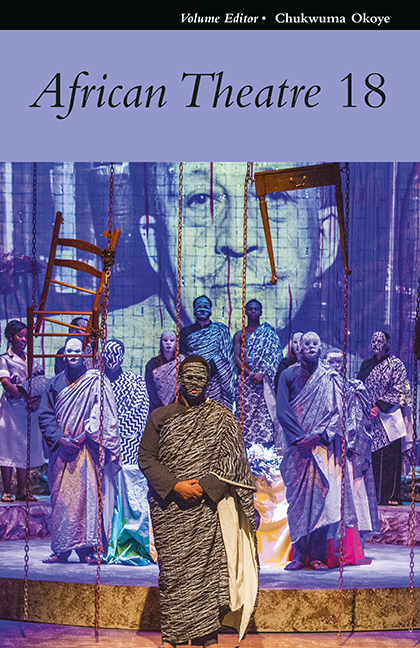Emmanuel N. Ngwang & Kenneth Usongo, Art & Political Thought in Bole Butake
Published online by Cambridge University Press: 02 April 2020
Summary
The creative ingenuity of the Cameroonian dramatist Bole Butake has inspired a quantity of critical material on African theatre and drama. Selected researches on Bole Butake include John Tiku Takem's Theatre and Environmental Education in Cameroon (2005), Hilarious Ambe's Change Aesthetics in Anglophone Drama and Theatre (2007), Pepetual Mforbe Chiangong's Rituals in Cameroon Drama: A Semiological Interpretation of the Plays of Gilbert Doho, Bole Butake and Hansel Ndumbe Eyoh (2011), and several articles by Christopher Odhiambo. The research insights of the listed works concur with Emmanuel N. Ngwang and Kenneth Usongo's book as they respond to Butake's employment of aesthetic imageries and indigenous knowledge to confront and deconstruct the politics of the state and indicate how the application of that politics restrict resourceful metaphors to a few individuals of a community. Unflinchingly, Ngwang and Usongo pursue a political stance in Art and Political Thought in Bole Butake which suggests that the imaginary Fondoms and Chiefdoms in which Butake sets most of his plays are indeed metaphorical presentations of postcolonial African status quo in general, and Cameroon specifically.
It is within this political frame that Ngwang and Usongo examine Butake's collection of plays entitled Lake God and Other plays which contains Lake God, The Survivors, And Palm Wine Will Flow, The Rape of Michelle, Dance of the Vampires, and Shoes and Four Men in Arms. Both authors investigate Butake's thematic universe and aesthetic framework in a bid to capture Cameroon's postcolonial canvas which they argue is ‘saddled with numerous political and social abuses’ akin not only to the concerns of the Anglophones of that nation but also to other marginalized groups. However, it is worthy of mention that Ngwang and Usongo's interest in analysing the works of Bole Butake is to make a critical commentary on the ‘Anglophone Problem’ in Cameroon, a situation which has always pitted the English-speaking regions against the authority of the French-speaking leadership in the country, and which restricts development and political participation, and encourages persecution of the Englishspeaking regions. Therefore, Art and Political Thought in Bole Butake consists of ten chapters that critically explore the different subjects of Butake's drama.
- Type
- Chapter
- Information
- African Theatre 18 , pp. 186 - 189Publisher: Boydell & BrewerPrint publication year: 2019

